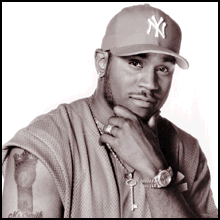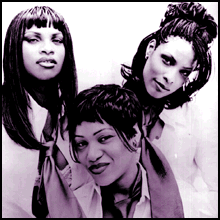![[Sidebar]](/standard/image/sidebar.gif)
![[Music Reviews]](/standard/image/headers/music_reviews_header.gif)
| clubs by night | club directory | bands in town | concerts | hot links | reviews & features |
Moms & pop
Salt-n-Pepa & L.L. get older, phatter
by Franklin Soults
L.L. Cool J
Scene one: it's December 1993, and an old high-school friend and I are driving around Syracuse, New York, catching up during our annual get-together holiday visits with the folks. She's a grad student working in Spanish linguistics, and she's thinking about doing a field study on Chicano rappers. To help her get a sense of the genre, I'm playing a mix tape of recent rap hits I like. Back in the day, she was as into pop music as any of my high-school pals, but her interest faded as her youth mellowed into adulthood, and so our talk about rap is low-key, cursory, easily distracted to other topics. But then comes Salt-n-Pepa's hit "Whatta Man," and she stops dead. She turns it up and listens as if I weren't there, grinning slyly, chuckling at her favorite lines, as radiantly absorbed now as she ever was at 17.Scene two: it's early 1997, and I'm at a casual dinner party at the apartment of another friend. Everyone there is old enough to remember entire eras I don't, and old enough to disdain most current pop culture I love. The eldest guest even has a son in college. Somehow, the subject of rap comes up, and that eldest guest asks, "Do you know L.L. Cool J?" I turn to her expecting a denouncement; instead she continues, "I think he's amazing, I have his album, Mr. Smith, or Mr. Jones, or something. I listen to it all the time. I just love the way he looks . . . the way he talks . . . the way he licks his lips -- my God!" Everyone stares, including me.
L.L. Cool J and Salt-n-Pepa are not the most successful rappers in history, and neither have they left as indelible a mark as Run-D.M.C. or Dr. Dre (though they've come close). But in a genre where careers rarely last longer than a single album, these two acts have been making album after album and scoring hit after hit for well over a decade. Their latest CDs, L.L. Cool J's Phenomenon (Def Jam) and Salt-n-Pepa's Brand New (London/Red Ant), debuted on Billboard a few weeks ago in the upper reaches of the Top 40. If nothing else, I think my friends demonstrated that this success has everything to do with the artists' rare command of one central pop-culture subject -- sex.
Salt-n-Pepa
Of course, sex is inescapable in pop music. From LeAnn Rimes to Sleater-Kinney, it just comes with the beat. Yet at first, neither 16-year-old James Todd Smith nor community-college students Cheryl "Salt" James and Sandi "Pepa" Denton had anything more to offer on the subject than most young sensations bum-rushing the radio at the dawn of rap's second wave. In fact, what was thrilling about Salt-n-Pepa's 1986 debut, Hot, Cool & Vicious (Next Plateau), was the way their sexiness was simply matter-of-fact, as natural as their hardness. But when they released the album's first single, that balance was turned upside down. The A-side, "Tramp," did well enough, but it was the non-album B-side, "Push It," that launched their careers as pop stars. Written, like all their early material, by their producer and mentor (and Salt's lover), Hurby "Luv Bug" Azor, the song lived up to its title, turning sex into a hook as insistent as the tune's maddeningly catchy synth riff. Azor and his crew were quick to capitalize on this formula, instantly re-releasing the album with "Push It" added on, and then plying the duo's frank sexuality without let-up for the next decade, scoring ever bigger hits like "It's Your Thang," "Let's Talk About Sex," and "Shoop."L.L. Cool J also quickly learned to make sex his selling point. Perhaps it was his youth, perhaps the times -- that brief period when "hard" didn't mean ghetto-centric. But after the success of his 1985 minimalist debut, Radio, his next move was the synth-washed and sincerity-soaked single "I Need Love," which is often billed as rap's very first love ballad. Although he caught a lot of flack for it, the song was a hit, and by his third album, the sprawling, wildly ambitious Walk like a Panther, he had learned how to work every angle between macho and mushy, discovering somewhere in the middle a persona that no other male rapper could touch -- the smug but appreciative cad, a lover of big ol' butts, jingling earrings, and other men's women (hey, he's that type of guy). As he put it in his new memoir, I Make My Own Rules (St. Martin's Press), "I kept listening to the great rappers and what made them great. And I found that each of them was doing rhymes that accommodated their voices. So I had to find mine. And I did."
If that sounds too easy, well, it is. Without overt boasting, I Make My Own Rules demonstrates how much hard work actually went into that achievement. In fact, the mere existence of the book is proof of L.L.'s extraordinary work ethic. It comes out at a time when he's making an all-out attempt to become hip-hop's biggest crossover star, appearing in numerous Hollywood films, major advertising campaigns, charity drives, and sideline business ventures, not to mention the third season of the UPN sit-com In the House. The book is also an act of contrition, one that he obviously calculated was necessary before he could make his bid for the mainstream limelight. At the ripe old age of 29 (he turns 30 in January), L.L. can recount his rise, fall, and rise again as a rapper, father, and responsible citizen, a story that reads like a combination of a Reader's Digest Dickens tale and a 12-step testimonial.
As L.L. readily acknowledges, it's really a story about power. From the time his father unloaded a shotgun into his mother and grandfather to the years of physical abuse suffered at the hands of his stepfather and then to his rapid development from uncontrollable school bully to adolescent mugger, L.L. seemed condemned to repeat a cycle of violence as a means of gaining some semblance of control in his life. Rap helped him escape his budding criminal career just in time, but it also led to a different loss of control -- his overindulgence in sex, a habit he recounts in Chapter 10, "Excess XXX." After hitting rock bottom with his 1993 flop, 14 Shots to the Dome, he pulled himself back up only by firing his entire business team, recommitting himself to the mother of his three children, choosing a new manager (and "personal spiritual tutor"), and then, finally, reviving his career with my fellow dinner guest's favorite album, Mr. Smith.
It makes for a good story (kudos to co-author Karen Hunter), but not such good music. At the close of the book, L.L. confesses, "There was a point when I couldn't focus on anything but my music. When I was doing an album, everything and everybody in my life suffered. Now I do what I can when I can . . . but my family comes first. That's the natural order of things." L.L. first learned to let go like this on Mr. Smith, an album that owes a lot to its guest artists and co-authors. Phenomenon tries to repeat this formula, but L.L.'s schedule has become so demanding, he seems to have dedicated less time than ever to the end result. At 10 tracks in length, it's far shorter than the hip-hop norm. Perhaps because of his new stance as Mr. Family Values, it's also more muted, less inventive. There's the major production number "Father," a churchy confession that ends up as a plug for his book. There are also a few songs that pull off a nice balance of fidelity and carnality, like "Don't Be Late, Don't Come Too Soon," which may not please his hard fans but gets where it's going, and "Nobody Can Freak You," a brisk sex rap with Le Shaun, his vocal sex partner from "Doin' It." And that's about it. It's not bad; it's not much of anything.
Salt-n-Pepa's Brand New, on the other hand, lives up to its title. Like L.L., the duo have recently refocused on religion, pulling back from their more overt sexuality, and they've also undergone a major management switch, finally breaking off their stormy relationship with Hurby Azor to produce themselves. Yet despite all this, Brand New is still their most consistent, fully developed album since their 1990 smash Blacks' Magic -- or maybe ever.
And maybe that's not such a surprise. After all, Salt has been developing her considerable songwriting gifts over the years, proving she was more than just her svengali's mouthpiece. Now she takes charge on most of the tracks, handling everything from an admirable anti-racism anthem ("Imagine," with Sheryl Crow) to a smooth croon over the "Good Life" she's living.
Elsewhere, Pepa handles Hurby's role, writing several love and sex numbers, like the sultry R&B/rap combo "Knock, Knock" and the bouncy jaunt "Boy Toy" (which is lifted higher, like so many of their raps, by the vocals of their trusty DJ, Deidra "Spin" Roper). The album isn't perfect -- they've never been the most imaginative rhymers, for one thing -- but it continues to right the imbalance set up by "Push It" so long ago. Of course, sex was never the whole story with these women: even at their most lascivious, they were always riffing off each other, having fun, expressing themselves. Being hard-working single moms, they now slip into the mantle of adult responsibility far easier than L.L. Cool J, and with far more grace. He just finished his book; they're still writing theirs. n
Salt-n-Pepa will headline the KIXmas Holiday Charity Concert on Sunday, December 7 at the Civic Center. See "Concerts" listings for complete details.
| home page | what's new | search | about the phoenix | feedback |
Copyright © 1997 The Phoenix Media/Communications Group. All rights reserved.

